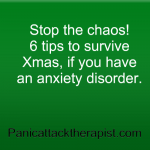breathing for anxiety or panic attacks
now browsing by tag
Surviving Xmas with an anxiety disorder

Although many people look forward to Xmas, with others it fills them with dread. If you have an anxiety disorder, feelings of apprehension may take hold several weeks before the festive season starts. I have put together some pointers to reduce your anxiety and make the holiday season more bearable, and possibly enjoyable.
1. Be honest! You may be invited to parties, or you may be hosting a party yourself. If you are invited to someone’s house, be honest with them. Tell them about your condition and explain how it might affect you. Have a back up plan, in case you start feeling unwell. Ask if you can use one of the bedrooms to have a rest and practise your deepbreathing exercises etc.
2. Don’t overindulge! Excessive sugar and caffeine may increase your anxiety. If you have to have alcohol, perhaps you could alternate with a soft drink. Remember to drink plenty of water throughout the day.
3. Stay in the moment! Don’t let your brain keep focusing on the future and catastrophising over everything. Keep saying to yourself “I’ll deal with it when it happens”.
4. Stay focused! If you are practising various techniques, like exposure therapy, these can fall by the wayside during the festive season. Make a list of things you need to practise each day, and stay focused!
5. You have been through this before and survived. You can do it again!
6. Remember that Xmas is a time for love and the most important person you can love is yourself.
Above all, I hope you and your loved ones have a peaceful and joyous festive season,
Vincent Benedict
www.panicattacktherapist.com
7 Steps to Recovery from Panic Attacks

There are 7 steps to recovery from panic attacks. If you are suffering from panic attacks, there is a good chance that you are jumping from one miracle cure to another, looking for that quick fix. By researching your condition, you are actually making your situation worse; having an anxious mind will cause you to think catastrophically about all the serious things Dr Google has come up with.
Instead, when I treat my clients, I find that the old tried methods still work the best. Forget all the new apps you are persuaded to download, the various multivitamins and expensive retreats. These are just placebo effects and are designed to empty your pockets. Instead, try and follow these 7 suggestions to get you on the right track:
1. Improve your knowledge.
Improve your knowlede about why these attacks are happening to you, but be careful where you do your research or who you listen to. Most therapists are inexperienced with anxiety disorders, and will try and link your attacks to some stressful situation in the past, lack of magnesium in your body or a chemical imbalance in your brain etc etc. Have a look at my website or ask me questions on my facebook page if you want to learn more about what is happening to you. To learn more about the symptoms, please click here. The main thing to accept to aid your recovery from panic attacks is that these attacks are harmless and you have had hundreds of them, without any problem.
2, Challenge your thinking.
When you are in this cycle of fear, it is normal to catastrophise about your situation. What if I faint in the supermarket, what if this fast heartbeat is a sign of a heart attack, what if my throat closes and I can’t breathe etc etc. With each of these thoughts, it is a good idea to write them down and ask yourself these questions:
a. What is it I am worried about?
b. What are the chances of it happening?
c. Am I blowing it out of all proportion?
d. Tell yourself “A thought is just a thought and can’t harm me.”
3. Continue with your life.
When you start having panic attacks, it is important to try and continue with your life, as normally as possible. It is important not to start avoiding places which cause your anxiety to rise. Try and continue going to work, going out shopping, going to the gym. By avoiding places/situations, you are sending a message to your brain that some places are scary and should be avoided.
4. Daily breathing exercises.
Many people who suffer from panic attacks have irregular breathing patterns. People with panic disorder take in about 15 to 18 breaths per minute; someone without an anxiety disorder takes in about 8 to 10 breaths per minute
It is important to practise abdominal breathing 3 or 4 times per day,and not only when you are having an attack. You only need to practise for a minute each time. You can practise whilst watching the tv, travelling in the car etc and no-one needs to know
that you are doing it.
I have developed a technique for breathing called the 3-3-5 and it has been proven over and over again to be effective in reducing the effect of attacks, and giving a feeling of wellbeing for those practising it daily.
5. Follow a healthy lifestyle.
Have a look at what you are eating and drinking. Try and reduce caffeine and replace it with camomile tea. Introduce some exercise into your daily regime; a daily walk is great but, if you find it difficult to leave the house, it is a good idea to follow an exercise video on Youtube. Daily exercise will also reduce your adrenaline and assist your recovery from panic attacks.
6. Meditation/visualisation/relaxation sessions.
Daily support is the most important thing in the recovery process. By this, I do not mean a telephone number you can ring, and a different person answers each time you ring.
Each day, your therapist should be leading you through sessions designed to make you mentally stronger. You need this mental strength to help you conquer your fear and also to carry out any exposure, when you choose to do so. I carry this out each day with my clients, and the results have been amazing.
7. Find a qualified therapist who specialises in this field.
I have never known anyone to recover by reading a book, or practising a yoga technique they have seen somewhere. You would not try to learn to drive from a book, so why are you wasting time where your health is concerned? Ask to see a list of the therapist’s qualifications, before you entrust him with your health. If he sidetracks your request, look elsewhere. Therapy is very affordable and you can find how much I charge here.
The above has been written by Vincent Benedict, a professionally trained therapist and considered by many to be the no 1 therapist in the field of anxiety disorders. To learn more about his methods, you can visit his facebook page by clicking here,
If you are interested in using his online programme, which has been effective for thousands of sufferers, please click here.
If you are interested in hiring him for face-to-face sessions to facilitate your recovery from panic attacks, he is available in UK, and overseas by arrangement. Please email Vincent Benedict at benedict449@btinternet.com to discuss your needs.
Vincent Benedict DipHyp, DipSPC, CertTH, NLP Pract
*** Disclaimer: Please note that, as with all therapies, results may vary from person to person.
Reduce your feelings of anxiety and panic
Guide to panic attack breathing

Panic Attack Breathing
Panic attack breathing is a great tool to learn to help you cope. When people are anxious, they tend to take rapid, shallow breaths that come directly from the chest. This type of breathing is called thoracic or chest breathing. When you’re anxious, you may not even be aware that you’re breathing this way. Breathing through the diaphragm, sometimes called abdominal or belly breathing, has been linked to reduced feelings of anxiety and panic.
Panic attack breathing is a great tool to learn to help you cope.
The easiest way to determine your breathing pattern is to put one hand on your upper abdomen near the waist and the other on the middle of your chest. As you breathe, notice which hand raises the most. If you are breathing properly, your abdomen should expand and contract with each breath. It is especially important to be aware of these differences during stressful and anxious times when you are more likely to breathe from your chest.
The above, often called panic attack breathing, will not help to eliminate panic attacks but will help you cope with the symptoms. To learn to eliminate anxiety / panic attacks for good, please go here.
Suggested reading regarding panic attack breathing:
The most important part of recovering from panic attacks is proper breathing. Learn breathing techniques to help you deal with your next panic attack.
www.healthyplace.com/anxiety-panic/articles/breathing-techniques-to-calm-anxiety-and-panic/
This can result in the person experiencing a panic attack seeking treatment in an emergency room. However, since chest pain and shortness of breath are indeed hallmark …
en.wikipedia.org/wiki/Panic_attack
During an emergency, our breathing rate and pattern change. Instead of breathing slowly from our lower lungs, we begin to breathe rapidly and …
www.anxieties.com/panic-step4.php
Related sites:
www.hypnosolution.co.uk

 D5 Creation
D5 Creation